- Words Larena Amin
- Creative Director Léa Federmann
- Photography Rashidi Noah
- Photography Assistant Brad Walsh
- Gaffer Sachin Parmar
- Fashion Matt King
- Fashion Assistant Kaiden Ford
- MUA Brooke Turnbull
- Hair Nuriye Sonmez
- Production Sunayah Arshad
- Location The Grace & Holborn Studios
Gentle and articulate, LOLA lets us in on her influences and intentions for ‘Flicker’, reflecting on new experiences, pushing past her comfort zone into unfamiliar spaces, and finding connection through music.
After taking the space to find new inspiration and clarity of intention, LOLA is back with her long-anticipated second project, ‘Flicker’. Intricate and experimental, it feels like a breath of fresh air – a glimmer of light amongst everything you’ve seen or heard too many times, flickering to remind us there’s more.
Following the release of her first extended play, ‘The Sleeping Prophet’, in 2020, LOLA took a thought-through two-year hiatus. This sonic silence was broken in Autumn 2022 with the aptly titled single, “Back” — the first single release from her new EP.
Across six tracks, ‘Flicker’ sees LOLA return with a body of creatively organic compositions, each song expressing a world of its own. At the time of writing, theproject has spent one month untethered and available for public consumption — a month in which she’s both found new meaning in the project and new ways to let it go.
Gentle and articulate, the artist lets us in on her influences and intentions for ‘Flicker’, reflecting on new experiences, pushing past her comfort zone into unfamiliar spaces, and finding connection through music.
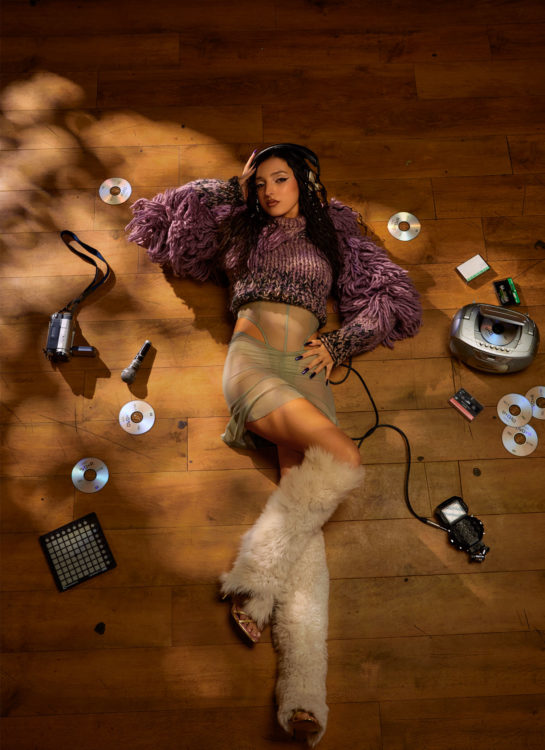
- Jumper & Dress KNWLS
- Earrings VALERIANE VENANCE
- Leg Warmers MARIÓ MARIA
- Shoes DSQUARED2 from HAUT
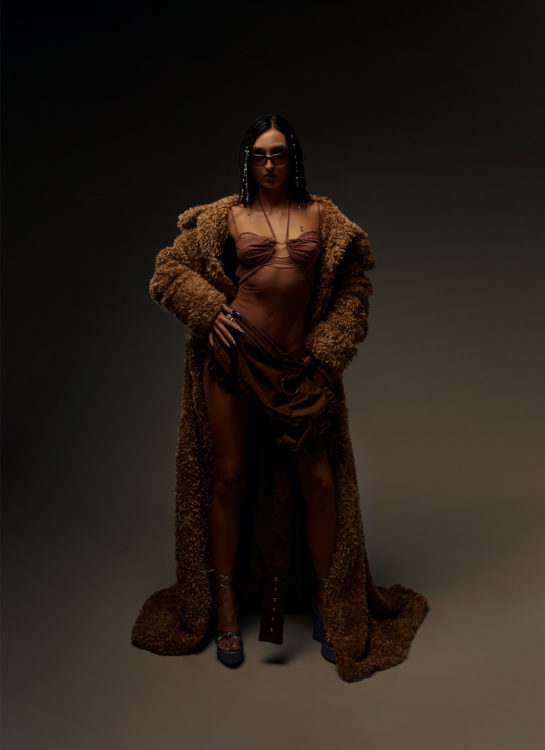
- Earrings, Coat, Bag worn as Skirt VALERIANE VENANCE
- Shoes MASHA POPOVA
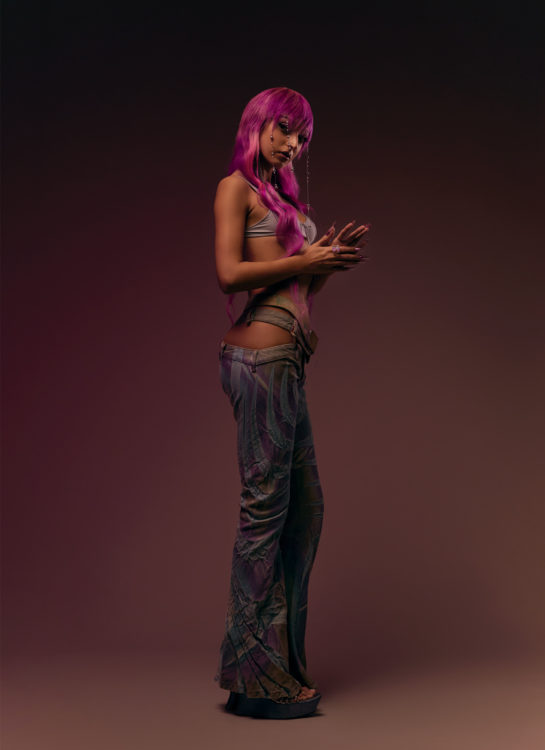
- Bra BELLO from HAUT
- Belt DIESEL from HAUT
- Trousers & Shoes MASHA POPOVA
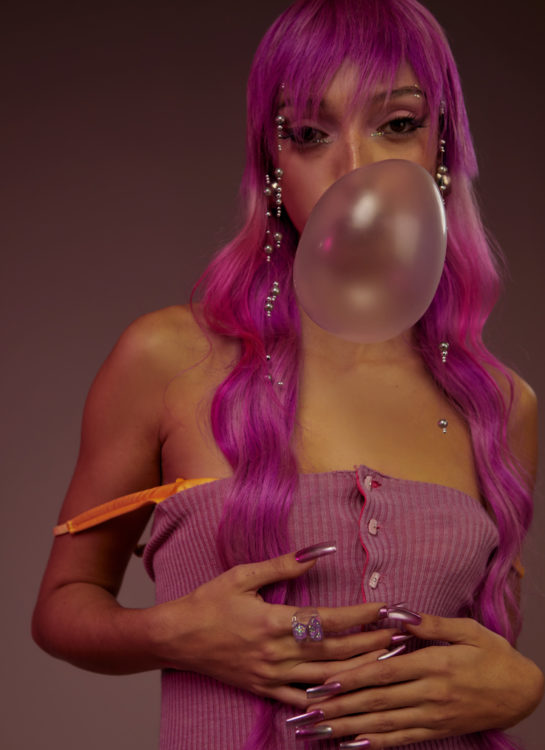
- Bra BELLO from HAUT
- Dress KATYA ZELENTSOVA
- Jewellery Stylist's archive
ON BREAKING THE BREAK, AND SAID BREAK
Firstly, congratulations. ‘Flicker’ has been out in the world for one month. How did it feel then? How do you feel now?
One month, and it feels like years. At the time, I felt really overwhelmed. Now I can see it more for what it is. It’s nice to have recent stuff out that people can reference. My first EP was made years prior to when I released it, so it felt outdated to me. It’s a bit of an upgrade, now it’s more relevant.
Would you be able to talk us through your break from releasing music and what it meant for you?
It didn’t feel like a break because I made two projects in that time. I didn’t feel any pressure to rush it at all, because I did that first EP and it was a lot of work. I understand more now why artists will make loads and loads of stuff in a chunk of time, and then spread out and keep that train going.
It was important to have time and space to think about the intention behind the things that I was doing, and open things up for experiences. I went to LA in that break and worked on music for two and a half months. It was lockdown for a big chunk of that time. I’m lucky I got to spend quality time with my mum, who I’ve worked with lots of stuff on. I started to learn how to work with what I had, instead of feeling like I had to have all of these fancy things to be able to make a great song. I had her old computer, some old Apple headphones and GarageBand — that was all that was really needed. I got to learn how to be independent, how to collaborate, how to write songs a little more effectively. I got to learn what inspired me and how to infuse it in my own sound.

- Jacket and Jeans OTTOLINGER by ISKO
- Bra BELLO from HAUT
ON LOS ANGELES
LA seems like a different world. A number of UK artists have spent time over there making music. What was your process like in LA compared to London?
In London I felt like I was convincing a lot of people to work with me, or fighting to make stuff. I was working with a label and working three jobs. Then suddenly there was all of this time, and it was someone from LA reaching out to me, wanting to work, who was very successful. I hadn’t really worked with someone on that level. LA has a lot of those types of people… Grammy Award-winning producers just everywhere.
The American audience is much bigger, and the type of music that they listen to is quite universal and simplified in a way. So learnt I how to structure things more, to do different genres and fit into different pockets while still having that same edge holding my own. Whereas in London it’s very much encouraged to be an individual and be independent and come up very organically. It was very useful from a business side, and from the artist side, to see that. It changed the way I look at music completely. I basically applied that knowledge to ‘Flicker’. It was a nice in-between of what I’d learnt from London and what I learnt over there, to segway into possibly releasing whatever I made in the US. I needed something that lies in-between to take us into that area.
ON STORYTELLING
What is the intention or importance of self-mythologising in your music?
Growing up, everything that’s really captivated me has had a storyline that I can follow or see myself in, even partly. Erykah Badu is a great example. She’s such a storyteller in her songs and a lot of her music videos reflect that, and it’s why it works so well. Linking your visuals to music, it just becomes magical. It takes the listener or the viewer outside of themselves for a moment. Suddenly you’re in this other person’s world. That’s an important thing, even more so now than ever. We’re overloaded with somany images, messages and negative news.I think it’s important to still inspire peopleand have that hopefulness. That’s something that really got me through a lot of difficult moments — to see that light at the end of the tunnel and feel like there was still some beauty in the world.
It’s a fantasy that I’m going to live in for a moment. That’s what I love about doing shoots — everyone wanting to evoke this one thing, a common vision. It depends on what music is playing on set, the set design, the team. It’s a real group effort.
Seeing yourself through another person’s lens, as that character or part of yourself that you’re trying to evoke, that’s one of the most fun parts of this for me. I hope I get to do it for a very long time, even if it’s not me in front of the camera, I could get involved in creative direction for other people. I would love that.

- Dress JAWARA ALLEYNE
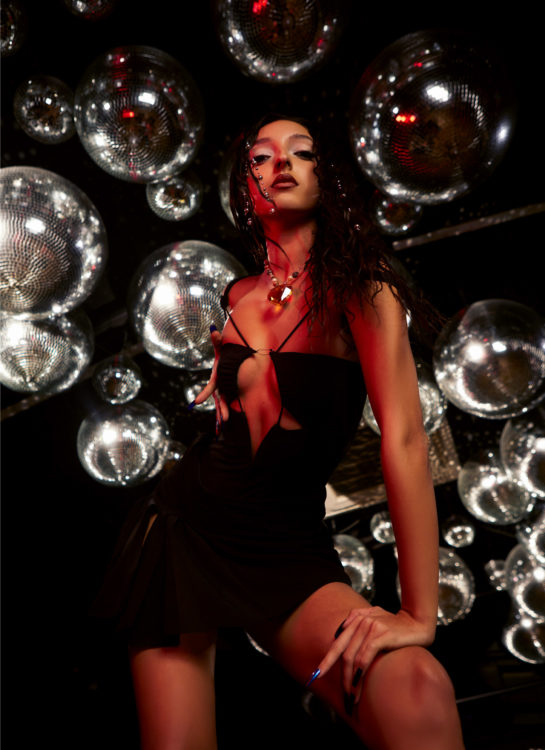
- Bodysuit and Skirt NENSI DOJAKA
ON CREATIVE PARTNERSHIPS
Your manager, Sharkkana, is also a creative in the fashion realm. What does that mean for your working relationship and your output?
I often refer to things that I’m working on as ours because she’s such an integral part of my work. I go to her with everything and I really trust her opinion. She’s a kind of visionary, in my opinion. She definitely sees things before they’re a trend. She’s also very hard working and honest. We’ve been working together for a few years, so the way our relationship has grown, I really trust her with everything.
Even the title of the project, I was sitting at her house and I was like, ‘What should we call this EP?’ We were going through different words that we already had, and noticed a beat name that Igloo (musician Iglooghost) sent over was called ‘flicker storm’. Sharkkana said, ‘‘Flicker’ works, and feels like it sums up the project’. I guess [it’s about] things being on and off again, ebbing, flowing, and changing all the time. That’s what life is, right? She felt that ‘Flicker’ was a really good visual representation of that. I don’t know what I would do without her.
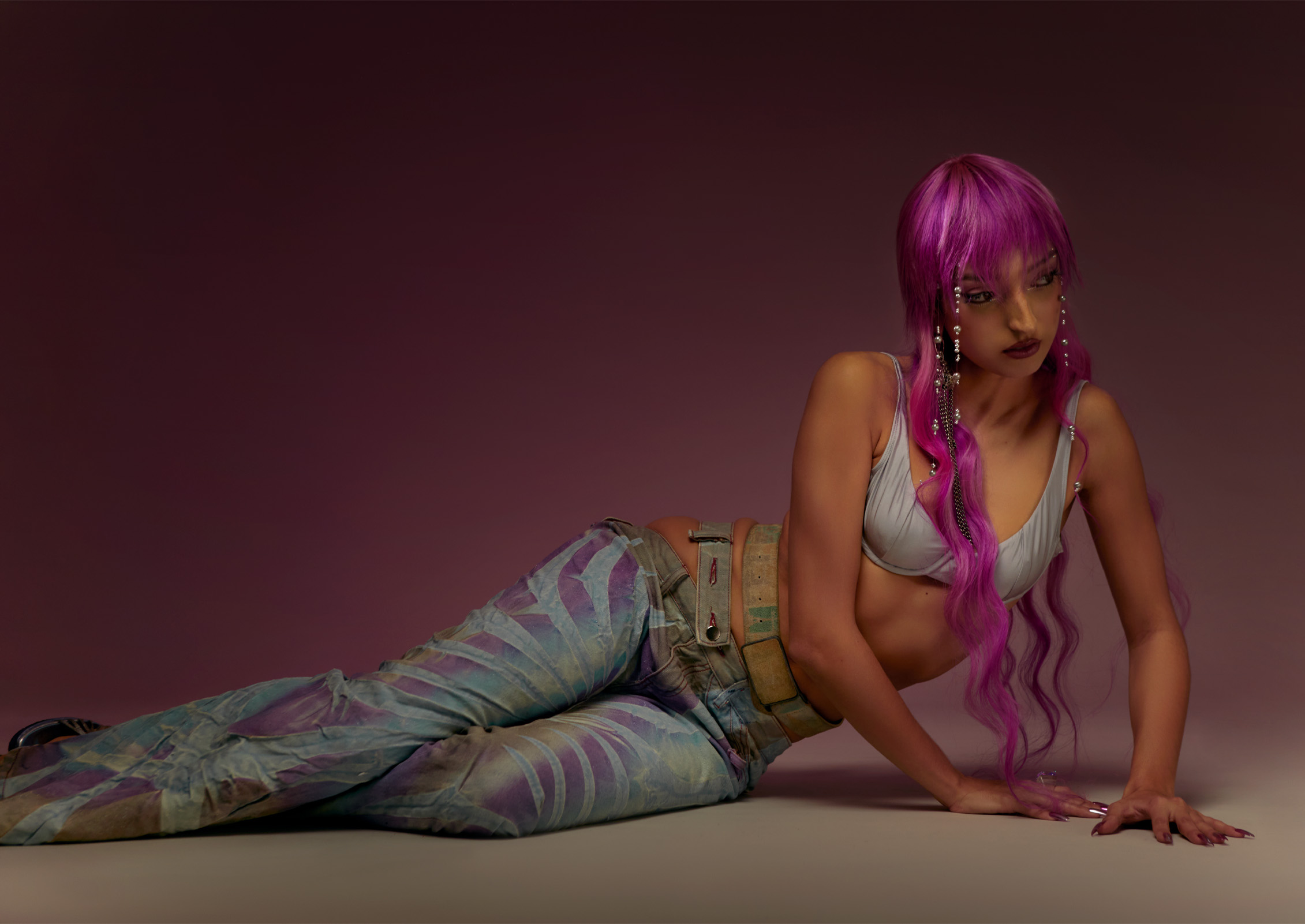
ON INFLUENCE AND INSPIRATION
In what environments does inspiration best come to you?
Being able to tap back into the emotion of how something made you feel. That’s the most human thing that we all have in common — relationships and how they affect us, how they make us feel. Tapping into that in the right moment and setting a clear intention with what you want to say as well. You might be so pissed off, but what is it that you want to say with that? Having a start and end in mind, but not leaving it too rigid, because then it’s just not fun anymore.
I have to remember that I’m a very lucky person to be able to have an outlet and a way to express these things, to be able to transform those emotions into something that I find useful or inspiring. I think it’s a real gift and once you start seeing it in that way, it’s always going to be inspiring.
What are some of the meanings behind your lyrics — the track “Alpha”, for instance?
So many kids are bullied and traumatised from it. I was scared of a lot of people and putting myself in another person’s hands. Assuming that everyone doesn’t like you or you’re annoying people — that’s how I thought a lot of people felt, that it was normal, until I had someone there who didn’t know me and was objective. This therapist I luckily saw when I was 16 started to walk me through questioning these thoughts that I didn’t think were irrational. My confidence got so much better. I guess by creating this vision for myself and then pretending that I was living that, you eventually become it. I wanted to write a song as a conversation with that younger self. ‘How do I get to be you?’ And then making the chorus an affirmation. Being a little bit bodacious. I am not a dancer, so with the lyric, ‘Do you fuck with me now I’m a dancer?’, I was like, ‘You know what? I’m going to manifest stuff’. That’s probably an easier song for me to explain.
What’s a harder song to explain?
“Feral Soul”. That’s an older song that a lot of people seem to really connect with. One day in Bali I went into the bathroom, looked in the mirror and saw this massive lizard staring at me. I’m not scared of lizards, but something about it felt like this lizard wanted to kill me.
So I ran out of the bathroom. I closed the door, called the lady I was living with and I was like, ‘Help me’. Before I even told her what was going through my head, she came in and said: ‘An evil spirit has entered this space. They told this lizard to come and teach you a lesson about the spirit world. What you need to do is make a little offering and leave it outside the door, and ask it politely to leave’. So that’s what I did, and it was gone when we opened the door. It was very enlightening. That was what inspired it initially, which is pretty out there. I’ve tried to keep my writing a bit more relatable since then.
ON THE FUTURE
How do you hope to take your next strides after releasing ‘Flicker’?
I got used to being isolated for a long time. Recently, I had an intimate event with this club in Soho that I’ve been working with, and a couple of fans of the music came. It was amazing to meet those people in person and connect with them. My dream is to be able to do music and live off of it, but I don’t think that would equal success to me. So moving forward, my intention is to keep having fun with it, keep reaching into those spaces and to connect with more people. That really is what makes it feel so worth it. Maybe that means more live shows or travelling. Trying out things outside of my comfort zone as well. But yeah, really just having fun with it and involving people in that in that fun. Bringing joy to people, inspiring people whatever way I can.

